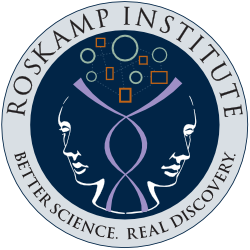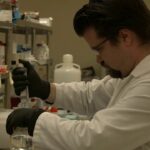Dr. Michael Mullen, Executive Director
During these challenging times, as well as taking many precautions at the Roskamp Institute to keep the laboratories and clinic functioning to serve our patients and keep the research advancing, we are paying special interest to the central nervous system aspects of SARS-CoV-2 infection. SARS-CoV-2 is the particular type of coronavirus that causes Covid19.
As with many viruses it’s clear that SARS-CoV-2 can get into covering membranes around the brain and into the brain neurons themselves in severe cases. Scientists at the Roskamp Institute are particularly interested in brain insults of all kinds because there is evidence that, in general, short term injury to the brain can contribute to long term damage including promoting conditions like Alzheimer’s Disease and Parkinson’s Disease.
In the case of Alzheimer’s, it has been suggested that certain viruses (such as herpes viruses) might contribute to chronic brain inflammation and damage. One of the advantages that these viruses have is that they can infect brain nerve cells and may cause acute inflammation and loss of the normal function of neurons such as learning and memory. Perhaps as importantly though, herpes viruses can live in nerve cells for decades and reactivate much later after the original infection. So despite the fact that such theories about the contribution of viruses to conditions like Alzheimer’s are controversial it remains plausible that acute or chronic activity of viruses could contribute to the initiation or propagation of the disease. Much more research is needed to prove or disprove these theories.
Another aspect of the SARS-CoV-2 pandemic that is relevant to Roskamp Institute research relates to a phenomenon known as “cytokine storms”. Cytokines are natural small proteins produced by many cells in the body, but particularly by immune cells in their attempt to defend the body against a huge array of environmental challenges. Classically, for instance, cytokines can be triggered by viruses and that is clearly happening in the case of SARS-CoV-2. The production of cytokines by the body is usually beneficial, as one key cytokine action is to activate the immune system so the viral challenge can be met and overcome. During this phase there is a feeling of being ill as a great deal of inflammation occurs in the fight between the virus and the body’s defenses.
Because cytokines have such powerful effects on the body they are tightly controlled and there are many natural “brakes” on cytokine production which usually occur once the activity of the viruses is slowed or halted. So usually the production of cytokines occurs during a short phase and starts to subside after four or five days which is the typical time of the acute symptoms of colds or influenza. After that follows the resolution stage as the cytokine levels fall and finally return to normal.
However, with some invasive bacteria and viruses the body’s defense cells are stimulated for longer periods during which cytokines are continually stimulated. It is during such unusual circumstances that the usual brakes on cytokines may fail for reasons that are not understood. But the consequence of this failure is a massive and very rapid buildup of cytokines which induces equally massive inflammation. These so-called “cytokine storms” can occur in any organ in the body and sometimes occur in many organs simultaneously, at which point the organs fail very quickly.
Roskamp Institute scientists have a long history of studying cytokines, particularly in relation to inflammation in the brain. It is of great interest that many of the same cytokines that are activated in viral and bacterial infections are also activated in chronic brain diseases. Because inflammation is a constant theme in brain diseases we have studied the causes and consequences of cytokine production in many disorders including Alzheimer’s Disease, Traumatic Brain Injury and environmental insults such as Gulf War Illness or Red Tide exposure.
One important aspect of our work at Roskamp Institute and Clinic is the design and synthesis of new chemicals that have anti-inflammatory properties. Drug discovery and development is a long and difficult process but we clearly need new and improved anti-inflammatory drugs. These potential new anti-inflammatory drugs may have many applications, but importantly they could find a place in the treatment of the many brain disorders we see in our neurology clinic patients. We have successfully developed and clinically tested such novel drugs and will continue to expand these programs to allow our patients to access these potential new therapies.

